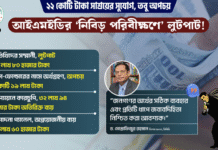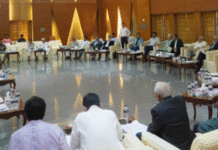Rights activists on Sunday voiced concern over the potential abuse of the Anti-Terrorism (Amendment) Bill 2013 as it will allow the Court to accept videos, still photographs and audio clips used in social media websites as evidence for under trial cases.
Addressing a public dialogue, ‘Challenges of Privacy and Security in Bangladesh: Perspective from Human Rights Defenders’, they feared that the law may become an instrument for criminalisation of opinions expressed online.
The dialogue was organised by VOICE, a non-government organisation, in association with Law Life Culture, Bangladesh Manobadhikar Sangbadik Forum; Bangladesh ICT Journalists Forum, Campaign on Citizen Right to Information, Equity and Justice Working Group (Equity BD), Online Knowledge Society and Sushashoner Jonno Procharavijan (SUPRO) at Cirdap auditorium.
Secretary general of Revolutionary Workers Party Saiful Haque said the Anti-Terrorism (Amendment) Bill 2013 which would allow the Courts to accept videos, still photographs and audio clips used in facebook, twitter, Skype, and other social media for trial cases.
Under this amendment, the police officers concerned will immediately inform the District Magistrates about the occurrence of any crime that comes under the purview of this Act and file cases against the persons or entity or foreign nationals, he pointed out.
Saiful said, “When the Anti-Terrorism Ordinance was first promulgated by the military-backed caretaker government in 2007, we raised concern regarding its potential for abuse, which proved to be true as we’ve witnessed a trend of persistent criminalisation of popular dissents and the tendency to reduce complex social, economic, political and cultural grievances into a purely criminal matter.”
Nijera Kori coordinator Khushi Kabir said, “Criminalisation of opinions expressed offline and online through social media or blogs is not only a violation of freedom of expression and the right to privacy, it also represents a new pattern of persecution of any voice of cyber dissidents, as well as human rights defenders and whistleblowers.”
Nagarik Oikya convener Mahmdur Rahman Manna, Law Life Culture executive director Rezaur Rahman Lenin also spoke on the occasion.
Source: UNBConnect










